 |
|
 |
2017
September
28-30
|
In re Hefner
[Revised twice.]
Here's a thought: Our response to the death of Hugh Hefner provides an opportunity
for Christians like me to explain Christian values to our non-Christian friends.
In spreading his hedonistic philosophy, he has given a lot of people the impression
that Christian morality is the exact opposite.
It isn't.
To get from his values to ours, you don't flip switches, you add dimensions.
We do not say that beautiful women are not beautiful.
We say they are more than bodies. And so on.
The way he describes it, Hefner did not set out to do harm. What he did was (as C. S. Lewis put it) "put second things first." We need to make it clear that we do not consider sexual pleasure or material possessions to be evil — they are things God intended us to enjoy in proper context (marriage and stewardship respectively).
But Hefner gave middle-class respectability to the practice of taking these things far away from proper context and making them primary. He did that via a slippery slope that starts with admiration of genuine beauty and talent, and proceeds to attraction without love, pleasure without commitment, turning human beings into objects.
We must judge his view of humanity by what it leaves out, not just what it includes. A popular and well-paid object is still an object. I am sad about the women who have eagerly acquiesced in their own degradation, and the men who have eagerly adopted an exploitative attitude toward their fellow human beings as if it were healthy and normal.
[Addendum:] Not having paid much attention to Hefner or his publications,
I took him at face value, but
there are
extensive, credible reports that his behavior toward his harem
was much worse than he admitted. Now that he is not around to exert power over anyone,
I expect more of this to come out and to be investigated.
Hugh Hefner must have done as much as any thousand other people to promote and
entrench the "rape culture" that is now such a constant menace to college women —
the expectation, on the part of young men, that young women are or ought to be
constantly available for casual sex, that "when she says 'no' she means 'maybe.'"
It is very sad that so many prominent women (actresses, etc.) considered it
glamorous to be exploited by him and to support him publicly.
That was a very bad influence on millions of others.
"Entertainment For Men" (At The Expense Of Women).
Good riddance!
Permanent link to this entry


|
2017
September
21-27
|
No, the world didn't end
No, the world didn't end, and neither did the Daily Notebook,
but I am devoting all available writing time to Digital SLR Astrophotography,
and Notebook entries will be sparse. Today, just a couple of short notes.
Lemurs at Yale? While I wasn't looking, Yale University went and built two
more residential colleges (residential units that looks like Oxford or Cambridge
colleges but are not autonomous). One is named after Benjamin Franklin, to
which I reply that the University of Georgia
beat you to it by more than 200 years,
and the other is named after civil rights activist Pauli Murray.
Taking the last syllable of her first name and the first syllable of her last name,
the students have nicknamed themselves lemurs.
They also issued a press release about Ms. Murray's "transgressive gender expression,"
or something like that, which makes it sounds like they have a college for girls who
want to be boys, or maybe the other way around. But no... that's just a Yale vocabulary
challenge. "Transgressive" means "crossing boundaries," something every educated woman
in the 1960s had to do plenty of. They never said "transgender."
A test of brain capacity: This whole flap about kneeling football players
has been a stiff test of whether people can understand that there's more than one issue.
Some people can't; they choose one of the 8 or so inflammatory issues, and rant, and rant,
and rant. A few of us can understand that there are problems both with the original
protest (which failed to communicate clearly) and with President Trump's call for the NFL to
suppress the protest. (A sitting president shouldn't ask for a protest to be suppressed, even if
he's only asking.)
Anyhow, it certainly took people's minds off the devastation of Puerto Rico and
other islands, the apparently impending resumption of the Korean War, and the
Republicans' failure to repeal Obamacare.
Permanent link to this entry


|
2017
September
19-20
|
No, the world is not about to end
(Nibiru, Revelation 12, Leo, Virgo, etc.)

This is not a picture of the secret planet Nibiru.
Neither is any other picture you have ever seen.
There is no such planet.
A weird mixture of ideas has been making the news, pertaining to a secret or
invisible planet called Nibiru, plus an astronomical interpretation of St. John's vision in Bible chapter
Revelation 12 (or just part of it),
and claims that extremely rare "signs" are happening in the sky.
The whole thing seems to be the doing of one man,
named David Meade, with no discernible qualifications.
I thank the Washington Post for outing him.
(The Nibiru cult and some astrological interpretations of Revelation 12 were already
extant, but he seems to have combined and elaborated them.)
I think his real motive is to make a lot of people look silly.
The episode has certainly created a
field day for people who want to make fun of Christians.
Fox's web page gave the impression that this weird package of ideas
is a mainstream, or at least common, Christian belief.
They wrote about "Christian numerologists," which are almost as rare
as chickens' teeth.
I won't dignify Mr. Meade's farrago with detailed refutation, but let me just point
out a few things.
- There is no Biblical astrology.
Except for the Magi who visited Jesus from Persia, nobody in the Bible
sees or interprets signs in the sky. We do not find Isaiah, Jeremiah,
or St. Paul reading meanings from constellations and planets.
- Objects in the Solar System move in orbits. They pass in front of the
constellations Leo and Virgo regularly.
- Even leaving out Nibiru, most circulating versions of the story are
astronomical nonsense, claiming that chance arrangements are much
rarer than they are, or claiming things are happening that flatly aren't.
- If a planet were about to hit us, we would already be able to see it —
by now it would be brighter than the full moon, and its gravity would have
been affecting other planets' orbits for centuries.
- The sky is something you can look at! NASA can't "conceal" something that's
up there for everyone to see.
- Astronomers don't keep secrets. On the contrary, they trumpet their
discoveries to the whole world and eagerly seek confirmation by other astronomers.
Ah well — if nothing else, this has enabled me to identify some people
who aren't too bright. But the ridicule it has brought to honest Christians
(who have never believed or even heard of this nonsense) is very sad.
Permanent link to this entry


|
2017
September
18
(Extra)
|
Personal information is not proof of identity
In response to the Equifax incident, I want to hammer home this point to anyone in the business world who will listen:
PERSONAL INFORMATION IS NOT PROOF OF IDENTITY.
It should not be possible to impersonate me using just the information that got out in the Equifax breach (name, address, SSN, account numbers, etc.).
Financial institutions have confused identifying information (the information that distiguishes me from the other Michael Covington who works for Edelbrock) with proof of identity, which is a much stricter requirement.
In my years of teaching, I learned that
some people have
trouble with logic. Some people mix up "all fire trucks are red" with "all red things are fire trucks."
In the same way, people have mixed up "the real Michael knows Michael's SSN" with "anybody who knows Michael's SSN is the real Michael."
I do not have a complete solution to offer, and because of a related consulting job in progress, I can't be drawn into extended discussion here. I know people have had bad experiences.
All I want to do is point out what is wrong. It is not that people might find out my SSN. It's that people who know my SSN and a few other things can pretend to be me, with no serious proof of identity required.
Many financial institutions are already taking quite reasonable precautions.
Let's plug the holes in the rest.
Let us not lose sight of the real problem. Feel free to spread the word.
Permanent link to this entry


|
2017
September
18
|
More electrickery, or electricianry, or something
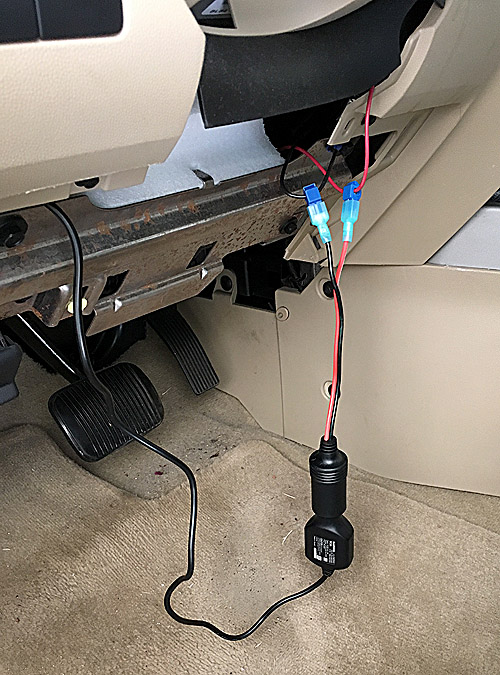
My project for the afternoon of the 17th was to add a hidden 12-volt outlet,
wired to a switched 12-volt line, for the GPS. The GPS has to have its original
power cord, which contains a voltage converter and a UHF receiver for the backup
camera, and I didn't want to cut into this $90 cord, so instead I bought a plastic
12-volt socket, plugged it in, and taped it in place. Here you see the work in
progress.
This is the car Melody drives, and in the interest of safety I didn't want her to
have to remember to turn on the backup camera. Instead, the GPS is on whenever
the car is running, and it displays the image from the backup camera whenever the
car is in reverse.
Permanent link to this entry


|
2017
September
16-17
|
Our pastor's advice to cohabiting couples: Don't
Our pastor, David Mills, gave a very
good sermon today on the subject of cohabitation
(living together, with sexual intimacy, without marriage).
His points were basically two:
(1) Christian morality on this point hasn't changed;
(2) Sociological and economic data show that cohabitation is a bad deal.
"Trial marriages" don't prevent divorce; they increase it.
And couples who won't make a commitment together can't plan their future together.
Which leads to my jumping-off point. My question for any cohabiting couple
would be, "Where do you expect to be in ten years?"
Almost invariably, one of the two expects to be married, and the other
expects not to be married — in effect, expects to break up.
And when you break up, you will be turning someone loose on the world
after having used up a good bit of her or his life.
Will that give your ex-partner a good life in the future?
But maybe, when you break up, you expect to be tired of your partner,
and angry, and not to care about
the other person's future.
You see the underlying theme of exploitation rather than love.
Cohabitation = lack of agreement = taking advantage of someone,
getting them to give what you won't give.
Permanent link to this entry


|
2017
September
15
|
Equifax breach, again
Something I just said on Facebook...
No, the Equifax breach is NOT going to "wipe out billions of people's life savings."
No, you are not helpless.
No, your "identity" is not going to be "stolen." You don't have an "identity" that people can "steal." "Identity theft," like "cyberspace," is a buzzword made up by people trying to avoid responsibility...
...and now they've had their wake-up call.
If people get my personal information from Equifax and steal from my bank accounts, they are robbing the bank, not me! The bank still has to give me my money. If they gave it to some other bozo just because he knew my SSN and account number, they were duped and it's their own fault.
Simply because of the size of the Equifax breach, I think it's going to change practices industry-wide. I haven't requested a credit freeze myself. Why? Because the entire nation needs more protection, and the entire nation is going to get it.
If only a few people's information gets out, those people are in danger. If everyone's information gets out (and please note it's not top-secret information in the first place), then the entire industry has to change its practices, and will do so.
Permanent link to this entry


|
2017
September
14
|
Sexagesimo anno
There are unconfirmed rumors that today is my 60th birthday.
I maintain, however, that the digits on my birth certificate are in
the wrong order and I was actually born in 1579.
I don't know why Facebook is making such a spectacle of my birthday;
it's not as if I haven't been having them regularly for quite a while.
But I thank more than 200 people for their greetings and best wishes!
After breakfast and lunch at home, I spent much of the afternoon and
evening in one of my favorite places, the UGA Science Library, working
on two research projects. While there, I received a Facetime video
call from the grandchildren.
Speaking of telephony, we agree that taming
the telephone was
a really good move.
In most of the house, telephones don't ring.
You can't wake us up at 3 a.m. or even 7 a.m. by telephone.
We get a great feeling of freedom from
not being available to everyone 24 hours a day.
Those of us accustomed to mid-20th-century practices might think this
dangerous; how would people get hold of us in an emergency?
But wait a minute — exactly what kind of emergency would that be?
We don't have teen-agers out roaming around late at night.
If we did, we would take a cell phone into the bedroom and instruct
them to call that.
And as for other emergencies, as I once told my mother before making
an overseas trip, if I get run over by a truck in Germany, it will be
up to the Germans to call the ambulance.
I know that in some extended families, whenever someone dies, it is
customary to call everyone, even if it's 2 a.m., and let them know.
Right now we don't have anyone close to death.
And even if we did, I'm not sure what good it would do anybody
to be awakened in the middle of the night.
It's just a mid-20th-century custom.
Permanent link to this entry


|
2017
September
11-13
|
The Equifax data breach
[Updated.]
People keep asking me what they should do in response to the
Equifax data breach.
In the interest of accuracy in this fast-developing situation,
I don't want to say more than I know.
The place for breaking news is not this blog!
But I think the key point is that this is Equifax's problem and the banking industry's
problem, not the customers' problem. Equifax needs to (and will) take care of this whether
or not you do anything. Consider how much they have at stake!
The information that reportedly got out is names, addresses, Social Security numbers, and credit card
numbers — not passwords or anything else really secret.
I think the banking industry has made a mistake, and this is their wake-up call.
The mistake was accepting SSNs as proof of identity and credit card numbers as proof
of authorization to charge. Neither one was intended to be any such thing.
Credit cards have other safeguards (CVV numbers, chips, cardholder's address)
to deter unauthorized use, and SSNs were not intended to be secret in the first place.
Their purpose (like date of birth or mother's maiden name) is to distinguish
people with similar names, not to prove that someone is who he says he is.
I do have three practical pieces of advice.
(1) Watch your credit cards for false charges. You should always do that because
it's always a risk. Equifax breach or no Equifax breach, your credit card number
is in the files of every business where you've ever used it.
(2) To see if impostors have opened accounts in your name,
you can and should monitor your own credit reports via annualcreditreport.com.
This is a federal government-sanctioned site.
Yes, you have to put in personal information to use it — but that's what it's for,
and it's reliable.
(3) Be wary of signing up for other monitoring services, even those offered by the
business that was breached (in this case Equifax).
I have heard scattered reports that in some cases, such things may have hidden fees or involve
agreeing not to sue. In any case, they don't do a lot of good.
A credit freeze (which you pay for, at all three bureaus) does more good,
but only if the lenders bother to check the applicant's credit.
But it is the banking industry that needs to run a tighter ship.
It's not your job to defend yourself against a flawed system.
Permanent link to this entry
Stormy day
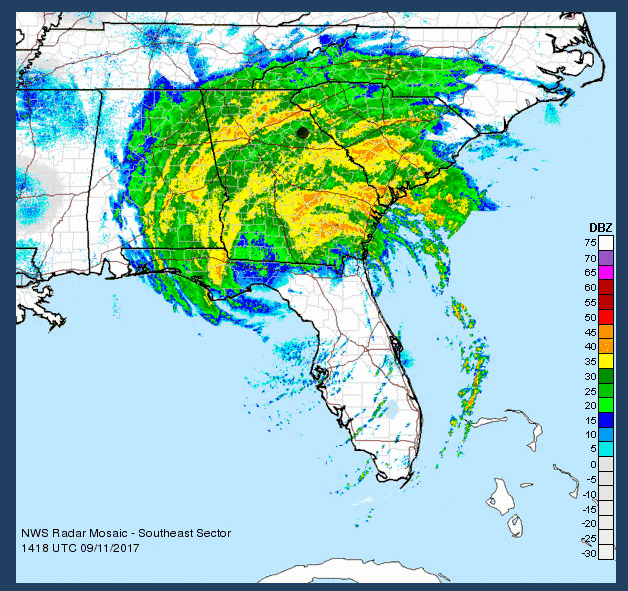
Hurricane Irma is making its way through Georgia now.
I'm at the black spot above center; the eye of the storm is far to the
southwest of me.
It's rainy and windy all over.
This afternoon we're supposed to have 50-mph winds.
After several hours of rain, that will make trees fall;
indeed, it already has.
The University is closed both today and tomorrow,
largely so that commuting faculty and staff won't have to travel
through treacherous conditions.
[Addendum:]
1.5 million Georgians are without electric power tonight (Sept. 11),
but, remarkably, we are not among them; we only had a few glitches.
On Timothy Road just a block from the end of our street,
a 15,000-volt power line fell down into a large puddle in a ditch,
and the Fire Department photographed it emitting sparks and flames
(I was nowhere near it!).
Trees have fallen all over town and all over Georgia; at least two
trees have killed people, and at least two of my friends have had
major damage to their houses.
It was a good day to stay inside.
I worked on the new edition of Digital SLR Astrophotography.
Permanent link to this entry


|
2017
September
10
|
The end of the telephone as we know it
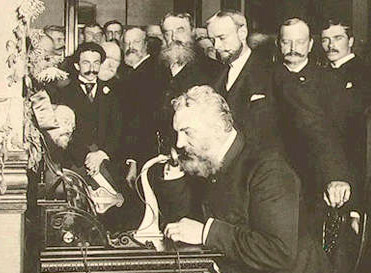
[Revised.]
This evening we took a step that many of our friends and neighbors have already taken:
we silenced our land line telephone and no longer receive calls on it.
It does not ring;
it goes straight to an answering machine.
(Actually, we relented and kept one ringer on, at low volume, along with
talking Caller ID, at least for the transition period.)
We still use the land line for outgoing calls, but we receive calls on our cell phones.
We were driven to this. This morning (Sept. 9) were awakened by a
phone scammer (a "brief political survey")
and got four more scam calls in the next two hours, two of whom were the same Indian
charlatan claiming to be "tech support."
It makes me sad that I can't keep using the telephone the traditional way, but on
the other hand, maybe the mid-20th-century tradition wasn't quite in line with the
best etiquette and courtesy. Hear me out...
Must we be available 24×7?
Back in the 1960s, it was considered vitally important to answer every call.
("It might be important! It might be Long Distance!")
And in that respect the telephone differed from normal good manners.
It was the only situation in which we were expected to be "at home for visitors"
around the clock, seven days a week.
Back then, of course, we didn't have robocallers, and scammers were infrequent,
though we did have them (maybe once in six months).
The high cost of long-distance calls ensured that
unwelcome calls were rare; local pests were easily caught, and
distant pests couldn't afford to do much pestering.
So I actually think it is an advance in courtesy and etiquette that
people nowadays reserve the right to mute their telephones and send the calls
to voicemail.
Why do we have a land line?
Why do we still have a land line at all?
Mainly for emergencies. In a medical emergency, fire, or burglary
("home invasion" they call them now), I want to be able to reach
for a telephone on the wall rather than wonder where I left my iPhone.
And I want the 911 dispatcher to be given an accurate address
automatically.
Whether these reasons to have a land line are compelling, I am not sure.
We'll see how we feel about it in a few weeks.
Two things people don't understand
I've received a lot of well-intended advice that wasn't very helpful.
I want to hammer home a really big point:
It shouldn't be my job to defend myself single-handedly against scammers,
charlatans, and pests.
Before telling me what I should or could do, please explain why you think it
is acceptable for a civilized society to allow scammers to wake me up and
pester me all day.
A major component of law and order is missing. I'll return to this.
Further, don't tell me to "check the Caller ID and if you don't recognize it,
don't answer it." Checking the Caller ID on a ringing telephone is as
much work as answering it!
By then I've already been interrupted, and interruptions are what I
want to avoid.
A cultural shift
There is no reason the telephone should give everyone instant access to
everyone else — even though in the mid-20th century, many people thought
of it that way.
The root of what's changing is people's attitude toward interruptions
and demands for instant attention.
Different kinds of people have two completely different attitudes to
interruptions.
Some, including me, don't welcome interruptions; we're already doing
something, and interruptions interfere with it.
But plenty of others think interruptions are activity, and the time
in between interruptions is just blank.
This was, I think, more common when fewer of us were highly educated and
fewer people's work required prolonged concentration.
What's more, telephone calls half a century ago were much more likely to
be welcome and/or important.
Computer programming is a kind of work that really doesn't mix with receiving telephone calls,
and bad things happen when programmers are placed under managers or secretaries
who think that receiving every phone call is the most important thing there is.
I've heard stories...
The worst was about a room in which many programmers worked at
large tables (itself not a bad idea), where phone calls were announced over a PA system.
"[Click!] Ralph, line two..." At the sound of every such click, every programmer
in the room lost his concentration and needed 15 to 45 minutes to get it back.
The first place I encountered new-style non-ringing telephones was at
Coraid in the summer of 2008.
After a few days, not having heard a telephone ring at all, I picked one of them up
to see if it worked. Yes... All the incoming calls were channeled to an answering
service off site, which would then alert the programmers by e-mail or other means.
The ring is dead; long live the ring.
What can be done?
Clearly, the root of the problem is that telephony has become too cheap and too
unregulated. I remember the days when the local telephone company had
terms of service (like Facebook) and could kick people off for making nuisance calls.
The problem nowadays is that calls don't come from, or through, one telephone company.
Anyone with an Internet connection can use VoIP to inject calls into the worldwide
network without much accountability, and often with false Caller ID information.
I think the root of the solution is to make telephone companies care.
This might require changing regulations so they have the right not to deliver calls.
Then, fine the telephone companies that have a major role in transporting
or delivering scam calls. There's no reason scammers in India should be able to
call me, with false Caller ID data, and have the call actually delivered by AT&T.
There are also a number of ways to spam-filter the telephone, and I see this
being implemented everywhere except on AT&T's POTS (conventional land line service).
Charter Spectrum apparently offers spam-filtered land line service;
the hardware for it is actually installed in my house, though not in active use;
and I may just switch over.
There are also many good solutions involving smartphones and the Internet.
What telephone companies need to realize is that spam-filtering will win them friends
and save them money. I don't want to pay extra for it.
I want them to realize that by doing it, they save their own capacity and cut their own costs,
as well as keeping their customers happy.
I hear that the head of our Federal Trade Commission is giving robocalls and scam calls
top priority.
If only someone had felt that way 20 years ago... Several layers of regulatory and
technical changes are going to be needed.
The problem need to be fixed at the root,
by changing incentives and reponsibilities,
not by adding layers of complication on top of
what we have.
Permanent link to this entry


|
2017
September
9
|
The case of the ghost gymnasium
I wonder if any of my readers can help me solve a minor historical mystery.
Back in February 1971, in ninth grade, I went along, as photographer, with
Valwood School's basketball teams to play against Athens Academy in Athens.
They defeated us soundly, and adding injury to insult, due to a problem with
my camera we ended up with no pictures of the games or the trip.
I know it was February 1971; I was keeping a journal at the time; and anyhow
I know what grade I was in.
The mystery is where the game was played. I thought it was in one of
the first buildings built on Athens Academy's then-new Oconee County campus,
which they had not fully moved into. Specifically, I thought it was the building
now known as the middle school gymnasium. I've been in it as an adult, and
it matches my recollections.
Both schools are now celebrating their 50th anniversaries and are releasing
historical information. Athens Academy's history says the Oconee campus did
not exist in early 1971; a game couldn't have been played there until at least
a year later.
If I was mistaken, then whose gym was it? I certainly was sure it was Athens
Academy's at the time. I don't remember any signs or decorations clearly identifying it either
as theirs or as someone else's.
(I would certainly have noticed if it had some other school's decorations.)
Nor can I think of a possibly rented gym that would fit
the description — but every town has more gymnasiums than most people know
about, and they all have nearly the same architecture, so the fact that the current
middle school gym fits my recollection may not prove much.
Or are Athens Academy's historical records off by a year?
Permanent link to this entry


|
2017
September
8
|
We have a bit of a storm coming...
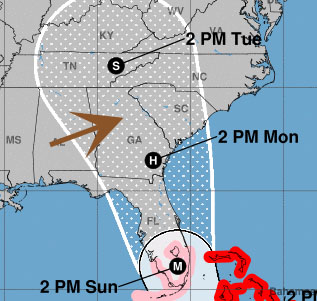
We're expecting a visit from Hurricane Irma. Does "inland" mean nothing to these idiotic storms?
In North Georgia, on Monday and Tuesday
we are expecting heavy rain, wind, and power outages, but not flooding.
I want to put out the word to evacuating Floridians that merely getting
into Georgia is not enough.
The storm doesn't stop at the state line.
South Georgia will be hard hit and partly evacuated.
North Georgia will shelter in place but will not have its
usual capacity to take in visitors.
Go farther north. Keep driving.
Permanent link to this entry


|
2017
September
6-7
|
Propaganda techniques to watch out for
I hope to write about this at greater length later, with examples from a radio
commentator whose name begins with L, but let me give you a preview now.
If you want to think clearly and assess facts accurately, you have to watch
out not only for outright lies, but also for propaganda techniques,
among them these:
- Mentioning things together without actually saying they are connected;
- Giving you vivid mental images as a substitute for facts;
- Dancing around accusations without actually making them.
The first of these is familiar from advertising. You see people driving a
particular brand of car and hobnobbing with the rich and fashionable.
Not for a moment would the advertiser claim the car causes you to be
rich and fashionable, but they want the association to stick in your mind.
The same thing happens in political discourse. Talk about X, talk about Y, talk about
X some more, talk about Y some more, and people will come away thinking X and Y are
associated, even though you never said so. You just hung the pictures on the same wall,
so to speak.
The second technique is familiar from the world of "memes." Instead of asserting that
something is common, or is big enough to be a problem, someone gives you just one
vivid example of it, which may or may not be real. The "welfare queen" notion is one
of them — lots of people "just know" the welfare rolls are full of "welfare queens"
because they have the mental image, not because they have any information.
And of course if you read Facebook, you have things like this shoved at you all day long,
totally unconfirmed facts, or even outright lies,
that generate mental images that stick with you.
That's what it feels like to be propagandized.
The third technique is especially insidious. Without actually saying that A did B,
or that X causes Y, some speakers and writers dance around the accusation,
saying a lot of things close to an accusation without ever uttering it directly.
Often, slander is couched in assertions that "this is how people do it" or
"that is how things are done."
Distinguish "dancing around" from genuine though speculative accusations, and also
from real generalizations about problems. Both of these are followed up by
logical consideration of the evidence, scant though it may be.
But the purpose of "dancing around" is to make you believe things
just because somebody is talking about them, not because
there is any evience to be followed up.
A few years ago I had the privilege of working with graduate student (now medical researcher)
Cati Brown Johnson, whose dissertation was on deceptive language used by the
tobacco industry.
A key characteristic of such language was reluctance to assert clear logical
connections between ideas or facts.
Instead, the deceptive writer would just mention things close together,
leaving you to associate them without knowing exactly what association was meant.
The same thing happens in political discourse and is equally deceptive.
Permanent link to this entry


|
2017
September
5
|
Melody behind the wheel
Today we have something big to be thankful for: Melody has resumed driving.
After 17 months, I no longer have to do all the driving for the three of us.
That makes a major difference to our time management.
We need for everyone to understand that this doesn't mean we're footloose
and fancy free.
During June and July, I got behind with all my work, and I still have catching
up to do.
The next edition of Digital SLR Astrophotography needs to be finished.
Then we all have a prioritized, long list of things to do, some of them business-related
and some of them personal.
So please understand that we're not able to accept invitations and suggestions
on a grand scale right now.
Permanent link to this entry


|
2017
September
4
|
Sunspots
If you still have your eclipse glasses, look at these sunspots,
which will be visible at least through September 6.
They are visible without magnification, although of course you won't
see all of the details in the picture.


This is the fruit of a 10-minute-long observing session that I squeezed into my
schedule before taking Melody to an appointment.
I put the Celestron 5 (vintage 1980) on its pier, with the Canon 60Da and a
Thousand Oaks full aperture filter (similar to eclipse glasses).
This is a stack of six 1/1000-second exposures at ISO 100, f/10,
stacked with AutoStakkert 3 and sharpened with Photoshop.
Permanent link to this entry


|
2017
September
2-3
|
Installing a backup camera
Now for something completely different. Back in January I used a car with a
backup camera, which immediately convinced me that I wanted one of my own.
On September 2 I finally got around to installing one.
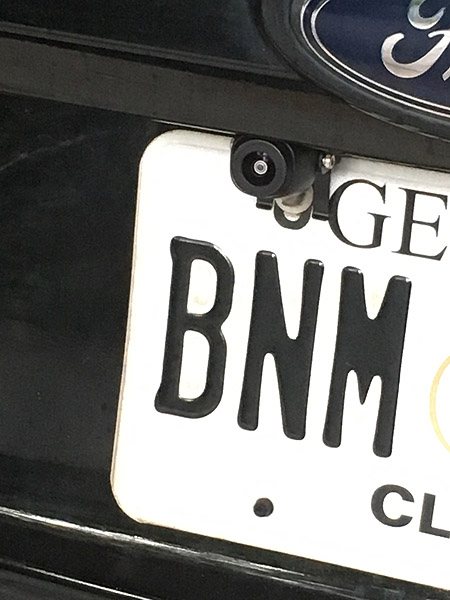
Its display appears on my GPS (satnav) device whenever I shift into reverse:
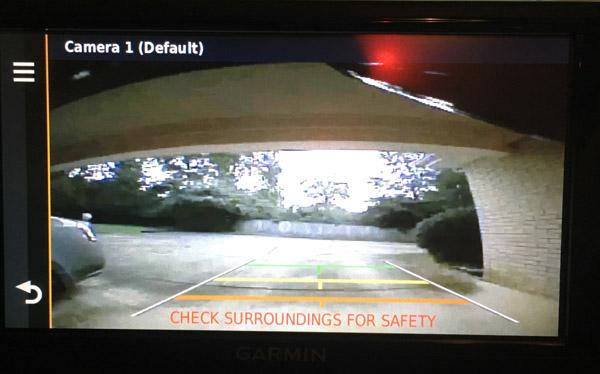
That is an extremely wide-angle view; the car on the left is parked beside mine,
not at an angle to it.
I chose a
Garmin BC 30 backup camera
and
Garmin
Nüvi 67LM GPS receiver, but there
are many others to choose from.
When adding the camera, you replace the original power cord of the GPS receiver with a special
one containing a receiver for the camera's wireless signal.
Accordingly, the GPS receiver doesn't need special installation — just plug it into
the lighter socket.
The camera is another story.
Professional installation is normally recommended.
The camera has to be installed so that it can perch on top of the license plate (or in some
other convenient position) while drawing electric power from one of the backup lights.
So the installation boils down to this:
- If your license plate is on the rear bumper, you have it easy.
Just run a wire, and you're done.
- If your license plate is on a liftgate or trunk lid that moves,
and the backup lights aren't, you have a challenge.
That was my situation.
Some of you know that
overly fastidious automotive wiring is one of my hobbies
(which I only get to practice about one afternoon every two years),
and I think I did a better-than-professional job.
The wire-fishing took about an hour,
and there is nothing visible of the camera installation except
the camera itself. (You can see new cables if you take off the
license plate and the right rear tail light. You could of course see
a lot more if you took apart the liftgate.)
Here's the process part way
through. You're looking at the raised liftgate of the Ford Escape, with its light tan
interior cover pulled away from the black metal.
A wire has been "fished" from the area of the tan interior cover, through a narrow
metal channel on the liftgate, and then through a rubber tubing conduit, to where
it will shortly enter the main body of the vehicle and make its way to the right
backup light.
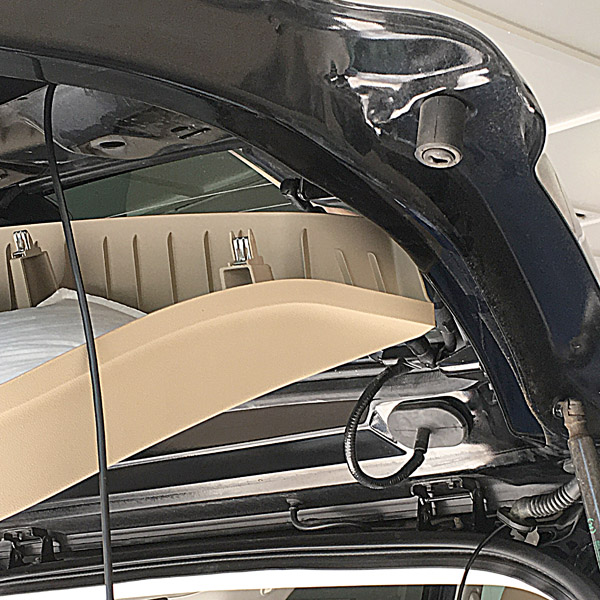
Two handy hints for those attempting such a thing:
- There's no reason you can't use a
fish tape
(a familiar house wiring tool)
in automotive work. Sometimes it's just the thing.
- To pull a wire alongside other wires that are wrapped
in sticky tape, or through rubber grommets and conduits that
create a lot of friction,
spray some Armor All
or STP "Son of a Gun" silicone protectant on them.
It's a good lubricant, and unlike oil, it's good for plastic
and rubber.
Phase 2 of the project will be
to connect the special power cord to a switched 12-volt line,
so we don't have to turn the GPS on and off,
and hide it inside the dash. This will involve installing
a hidden lighter socket whose DC power is switched.
Permanent link to this entry


|
2017
September
1
|
September!
[Revised.]
I have some milestones to note. First: I have lived to a greater age
than either of my parents did. Most of my generation will do this, but
relatively few will achieve it before age 60, as I have done.
Second: I've achieved a lifelong goal by successfully observing a total
eclipse of the sun. Clouds blocked my view of the one in my home town
(Valdosta) in 1970; I caught an annular eclipse in 1984; and finally, 2017
delivered what 1970 couldn't.
But even more importantly, Melody is in better health.
Her infectious disease specialist can find no sign of lingering infection
(although if it pops up, we'll fight it fiercely);
her PICC line has been removed, and I no longer have to give her an IV
every morning at 11:30. Her WoundVAC was removed some time ago, and she
can actually go out to dinner and go shopping.
Currently she walks with difficulty, with a walking stick, but physical
therapy will help that.
My least favorite month of the year is August, and it's over.
August is when we have our worst weather (very hot);
it's the month my mother died in 1985;
and it's a month in which I have often been a bit bored or frustrated by the
closure of the University.
For some reason, perhaps some chart that I saw in elementary school,
I think of August as orange or yellow on a magenta background.
September is my favorite month. There is a sharp improvement in the weather;
the beginning of the school year dispels the summer ennui;
and it's the month when many good things have happened,
including the better part of my trip around the world (1973)
and my birthday.
My fallible memory says September 1, 1970, was my first day of school at Valwood
(the school I liked best of any I attended), which means it was my first day
of studying Latin (the beginning of my linguistics career),
and also the day my 6-inch telescope arrived.
I have called it the first day of my adult life; I was not an adult, of course, but many
things were launched that day that have continued ever since.
There was more of a discontinuity between eighth and ninth grades
than between ninth grade and anything afterward.
But further investigation tells me I must
have conflated several dates near September 1, because I also
remember that Valwood's first day had a shortened schedule on a Friday morning,
followed by normal classes on a Monday; September 1 was a Tuesday.
I still have a couple of textbooks from that first year at Valwood.
In one of them I wrote the date it was issued to me, August 28, 1970.
That was the Friday, with a shortened schedule.
So I suppose I must reckon my favorite month as starting August 28th.
For some reason September is, for me, sky blue or Cambridge blue.
That may be because of the weather, which always turns cooler and clearer
abruptly around September 1.
Permanent link to this entry


|
|
|
This is a private web page,
not hosted or sponsored by the University of Georgia.
Copyright 2017 Michael A. Covington.
Caching by search engines is permitted.
To go to the latest entry every day, bookmark
http://www.covingtoninnovations.com/michael/blog/Default.asp
and if you get the previous month, tell your browser to refresh.
Portrait at top of page by Krystina Francis.
Entries are most often uploaded around 0000 UT on the date given, which is the previous
evening in the United States. When I'm busy, entries are generally shorter and are
uploaded as much as a whole day in advance.
Minor corrections are often uploaded the following day. If you see a minor error,
please look again a day later to see if it has been corrected.
In compliance with U.S. FTC guidelines,
I am glad to point out that unless explicitly
indicated, I do not receive substantial payments, free merchandise, or other remuneration
for reviewing or mentioning products on this web site.
Any remuneration valued at more than about $10 will always be mentioned here,
and in any case my writing about products and dealers is always truthful.
Reviewed
products are usually things I purchased for my own use, or occasionally items
lent to me briefly by manufacturers and described as such.
I am an Amazon Associate, and almost all of my links to Amazon.com pay me a commission
if you make a purchase. This of course does not determine which items I recommend, since
I can get a commission on anything they sell.
|
|













